|
|
|
Sort Order |
|
|
|
Items / Page
|
|
|
|
|
|
|
| Srl | Item |
| 1 |
ID:
133149
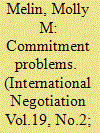

|
|
|
|
|
| Publication |
2014.
|
| Summary/Abstract |
Why do some militarized interstate disputes involve multiple third party attempts to resolve the dispute, while others seemingly end before movement towards peace is possible? This article examines third party commitment to international conflict resolution. I argue that a third party's commitment reflects strategic interests, barriers to entry and the conflict's prospects for peace, which encourage third party involvement while having a dampening effect on their commitment. I also explore the role of bias in management onset and third party commitment. Analysis of conflict management in militarized interstate disputes from 1946 to 2001 offers significant support for the hypotheses.
|
|
|
|
|
|
|
|
|
|
|
|
|
|
|
|
| 2 |
ID:
133147
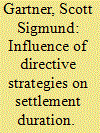

|
|
|
|
|
| Publication |
2014.
|
| Summary/Abstract |
Are Directive Strategies in international disputes the most effective mediation method for obtaining durable peace? A standard statistical analysis shows no effect of Directive Strategies on settlement durability. This result however, is misleading, failing to take selection and indirect effects into account. In this article, I identify when selection and process effects reinforce or oppose each other. Directive Strategies have opposing negative selection and positive process effects, which can distort inferences about their influence. Strategies' direct and indirect effects are also examined. Directive Strategies are more likely to lead to Full Settlements - the most comprehensive form of agreement, which improve the settlement durability (an indirect effect). However, Directive Strategies are used in more intractable disputes that result in fragile settlements (a direct effect). A statistical analysis of international disputes that takes these conflicting dynamics into account demonstrates the efficacy of Directive Mediation Strategies in producing durable agreements.
|
|
|
|
|
|
|
|
|
|
|
|
|
|
|
|
| 3 |
ID:
133153
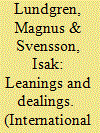

|
|
|
|
|
| Publication |
2014.
|
| Summary/Abstract |
Two characteristics of mediators - bias and leverage - are discussed intensively in the research on international mediation. However, whereas bias and leverage have been examined in mediation by states, relatively little is known about their role in mediation by international organizations (ios). This study provides new ways of conceptualizing io bias and leverage and utilizes unique data to measure the impact of io bias and leverage on mediation outcomes. Exploring all cases of civil war mediation by ios in the period 1975-2004, we find that ios where member states provide support to both sides in a conflict outperform ios whose member states remain disinterested. ios with significant trade leverage also increase the likelihood of mediation success. The study demonstrates that ios rarely have a neutral relationship to civil war combatants, that mediation by ios is laden with member state interests, and that such interests shape outcomes.
|
|
|
|
|
|
|
|
|
|
|
|
|
|
|
|
| 4 |
ID:
133146
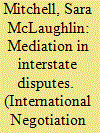

|
|
|
|
|
| Publication |
2014.
|
| Summary/Abstract |
This commentary provides a brief summary of the articles in this special issue and emphasizes four questions raised by this research: 1) ways to define and measure mediators' strategies, 2) teasing out demand side factors from supply side factors in mediation, 3) capturing differences between states and international organizations as conflict managers, and 4) understanding the role of particular conflict management actors like the International Criminal Court.
|
|
|
|
|
|
|
|
|
|
|
|
|
|
|
|
| 5 |
ID:
133154
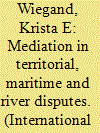

|
|
|
|
|
| Publication |
2014.
|
| Summary/Abstract |
This article seeks to explain factors that make mediation attempts more or less likely in territorial, maritime, and river disputes. I argue that the intensity of the dispute and the salience of disputed territory have strong influence on mediation attempts. The study further examines the impact of these factors on the type of mediation strategy (directive, procedural, or communications). Hypotheses about mediation attempts are tested with the icow data set of interstate territorial, maritime, and river disputes from 1816 to 2001. Findings indicate that intensity of the dispute and salience of disputed territory have a strong impact on the selection of mediation in the first place, and second, that salience of disputed territory makes the directive strategy more likely, while intensity of the dispute makes procedural or communications strategies more likely.
|
|
|
|
|
|
|
|
|
|
|
|
|
|
|
|
| 6 |
ID:
133155
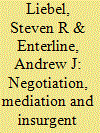

|
|
|
|
|
| Publication |
2014.
|
| Summary/Abstract |
How do negotiation and mediation affect the likelihood of insurgent victory in counterinsurgency (coin) wars? We develop expectations regarding the incentives of the combatants to negotiate and accept mediation while a coin war is under way, and the evolution of these incentives as a war progresses. Thirty nine civil wars are examined in which a foreign power intervenes to defend a central government against an insurgency during the period 1945-2009. We identify the subset of coin wars in which negotiations and mediation were attempted or took place, as well as their timing. The study examines whether the resort to these two instruments affects the subsequent duration and outcome of coin wars. We find that the resort to negotiations and mediation accelerates the time to insurgent victory, and explore reasons why political leaders in foreign powers would pursue such a path given the consequences of such action.
|
|
|
|
|
|
|
|
|
|
|
|
|
|
|
|
| 7 |
ID:
133152
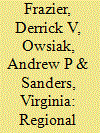

|
|
|
|
|
| Publication |
2014.
|
| Summary/Abstract |
Research on interstate mediation tends to assume (implicitly) that regional factors have little effect on the occurrence of mediation. We relax this assumption and advance an explicit regional theory of mediation in which regional ties create a type of bias that motivates both (potential) third parties to mediate conflicts within their region and disputants to select or accept these regional actors as mediators more frequently than non-regional actors. This bias first appears when states belong to the same region. In such situations, the potential third party and disputants likely understand one another better and share common security concerns. Yet regional membership does not explain the variation in mediation behavior within regions. To account for this, we argue that regionally more powerful states, as well as those that share (regional) institutional memberships with the disputants, have greater incentives to mediate than some regional counterparts. We empirically test the effect of these characteristics on the likelihood of mediation in militarized interstate disputes during the period 1946-2000. Our findings uncover support for our argument and suggest that accounting for regional bias is important in explaining mediation patterns in interstate conflict.
|
|
|
|
|
|
|
|
|
|
|
|
|
|
|
|
| 8 |
ID:
133151
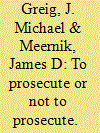

|
|
|
|
|
| Publication |
2014.
|
| Summary/Abstract |
The International Criminal Court (icc) came into force in July 2002 with the potential to drastically alter both the war fighting and peacemaking behavior of states. The icc is designed to try and subsequently punish those found guilty of war crimes, crimes against humanity, and genocide. Supporters of the icc have argued that its establishment will erode the norm of impunity that state and military leaders have historically enjoyed. Yet, another logic suggests that the initiation of an icc investigation or the issuance of an arrest warrant for individuals embroiled in an ongoing dispute may make matters worse. Such individuals may see little reason to stop fighting and reach a settlement if conflict resolution results in their detention in The Hague. Indeed, suspected war criminals and their patrons may wish to escalate their violence in order to avoid showing any sign of weakness or possibility of capitulation lest their enemies press the fight or their rivals seek to undermine their authority. In this article, we explore the potential impact of the icc on the likelihood of peace by examining the impact of actions by the icc - the initiation of investigations into conflict situations and the issuance of arrest warrants for those suspected of committing violations of international law - on the likelihood of mediation. Our findings suggest that while icc arrest warrants can encourage mediation, the initiation of investigations by the icc can actually undermine the occurrence of mediation.
|
|
|
|
|
|
|
|
|
|
|
|
|
|
|
|
|
|
|
|
|